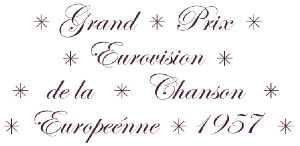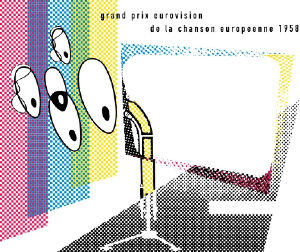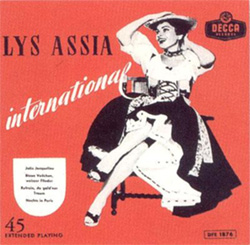
The Eurovision Song Contest 1956 was the first edition of the annual Eurovision Song Contest, organised by the European Broadcasting Union (EBU) and host broadcasters the Swiss Broadcasting Corporation and Radiotelevisione svizzera (RSI). The contest, originally titled the Gran Premio Eurovisione 1956 della Canzone Europea, was held on Thursday 24 May 1956 at the Teatro Kursaal in Lugano, Switzerland, and hosted by Swiss television presenter Lohengrin Filipello, which remains the only time that the contest has been hosted by a solo male presenter.

The Eurovision Song Contest 1957 was the second edition of the annual Eurovision Song Contest. Organised by the European Broadcasting Union (EBU) and host broadcaster Hessischer Rundfunk (HR) on behalf of ARD, the contest, originally known as the Grand Prix Eurovision de la Chanson Européenne 1957 was held on Sunday 3 March 1957 and was hosted at the Großer Sendesaal des hessischen Rundfunks in Frankfurt, West Germany by German actress Anaid Iplicjian.

Lys Assia was a Swiss singer who won the first Eurovision Song Contest in 1956. Assia was born in Rupperswil, Aargau, and began her stage career as a dancer, but changed to singing in 1940 after successfully standing in for a female singer.

The Eurovision Song Contest 1958 was the third edition of the annual Eurovision Song Contest. Organised by the European Broadcasting Union (EBU) and host broadcaster Nederlandse Televisie Stichting (NTS), the contest, originally known as the Grand Prix Eurovision de la Chanson Européenne 1958 was held on Wednesday 12 March 1958 at the AVRO Studios in Hilversum, the Netherlands and hosted by Dutch television presenter Hannie Lips. This marked the first time that the contest was hosted in the country of the preceding year's winner, a tradition that has been continued ever since.
The United Kingdom participated in the Eurovision Song Contest for the first time in 1957. The British Broadcasting Corporation (BBC) organised a national final, the Festival of British Popular Songs, to select the United Kingdom's entry for the contest. The country was represented by Patricia Bredin with the song "All" written by Reynell Wreford and Alan Stranks.
Germany held a national final to select the song that would represent Germany at the Eurovision Song Contest 1957. The winner was Margot Hielscher with the song "Telefon, Telefon".
Switzerland held a national pre-selection to choose the two songs that would go to the Eurovision Song Contest 1956. It was held on 28 April 1956.

"Refrain" is a song in French co-written by Émile Gardaz and Géo Voumard, and performed by Lys Assia. The song represented Switzerland in the inaugural edition of the Eurovision Song Contest in 1956 and became the first winner of the contest.

"Net als toen" is a love song written in Dutch by Willy van Hemert, composed by Guus Jansen and performed by Corry Brokken in 1957 as the Netherlands' entry and runaway winner of the pan-European Eurovision Song Contest, which gained other versions and popularity in several countries.
Switzerland participated at the Eurovision Song Contest 2005 with the song "Cool Vibes" written by David Brandes, Jane Tempest and John O'Flynn. The song was performed by the band Vanilla Ninja, which was internally selected by the Swiss broadcaster SRG SSR idée suisse in November 2004 to represent the nation at the 2005 contest in Kyiv, Ukraine. "Cool Vibes" was presented to the public as the Swiss song during the show Congratulations - 50 Jahre Eurovision Song Contest on 5 March 2005.
Switzerland participated in the Eurovision Song Contest 2004 with the song "Celebrate" written by Greg Manning. The song was performed by Piero Esteriore and the MusicStars. The Swiss broadcaster SRG SSR idée suisse returned to the Eurovision Song Contest after a one-year absence following their relegation from 2003 as one of the bottom five countries in the 2002 contest. The Swiss entry for the 2004 contest in Istanbul, Turkey was selected through the national final Eurosong 2004, organised by the broadcasters part of SRG SSR idée suisse. The Swiss-German/Romansh broadcaster Schweizer Fernsehen der deutschen und rätoromanischen Schweiz, the Swiss-French broadcaster Télévision Suisse Romande (TSR) and the Swiss-Italian broadcaster Televisione svizzera di lingua italiana (TSI) each conducted varying selections and a total of twelve entries were selected to advance to the televised national final—four artists and songs from each selection. The twelve finalists performed during the national final on 6 March 2004 where two rounds of regional televoting ultimately selected "Celebrate" performed by Piero Esteriore and the MusicStars as the winner.
Switzerland participated in the Eurovision Song Contest 2002 with the song "Dans le jardin de mon âme" written and performed by Francine Jordi. The Swiss broadcaster SRG SSR idée suisse returned to the Eurovision Song Contest after a one-year absence following their relegation from 2001 as one of the bottom six countries in the 2000 contest. The Swiss entry for the 2002 contest in Tallinn, Estonia was selected through the national final Eurosong 2002, organised by SRG SSR idée suisse. Eight entries performed during the national final on 2 February 2002 where two rounds of public voting ultimately selected "Dans le jardin" performed by Francine Jordi as the winner. The song was later retitled as "Dans le jardin de mon âme".
Belgium was represented in the Eurovision Song Contest 1957, on 3 March 1957, by Bobbejaan Schoepen with the song "Straatdeuntje", written by Harry Frekin and Eric Franssen and performed in Dutch. The song was chosen during a national final with Schoepen performing all entries.
Denmark took part in the Eurovision Song Contest for the first time at the Eurovision Song Contest 1957, held in Frankfurt, Germany. The Danish entry was chosen during a national final called Dansk Melodi Grand Prix.
The Netherlands were represented in the Eurovision Song Contest 1957 by Corry Brokken with the song "Net als toen" written by Guus Jansen and Willy van Hemert. The Dutch entry was chosen during a national final called Nationaal Songfestival and the country would go on to win the Eurovision Song Contest.
Switzerland competed at the Eurovision Song Contest 1988, held in Dublin, Ireland.
Switzerland participated in the Eurovision Song Contest 2012 with the song "Unbreakable" written by Gabriel Broggini and Ivan Broggini. The song was performed by the duo Sinplus. The Swiss entry for the 2012 contest in Baku, Azerbaijan was selected through the national final Die grosse Entscheidungs Show 2012, organised by the Swiss German speaking broadcaster Schweizer Fernsehen (SF) in collaboration with the other broadcasters part of the Swiss Broadcasting Corporation. SF, SF's radio station DRS 3, the Swiss-French broadcaster Radio Télévision Suisse (RTS) and the Swiss-Italian broadcaster Radiotelevisione svizzera (RSI) each conducted varying selections and a total of fourteen entries were selected to advance to the televised national final—six artists and songs from the SF selection, three from the DRS 3 selection, three from the RTS selection and two from the RSI selection. The fourteen finalists performed during the national final on 10 December 2011 where public voting ultimately selected "Unbreakable" performed by Sinplus as the winner.
Switzerland participated in the Eurovision Song Contest 2013 with the song "You and Me" written by Georg Schlunegger, Roman Camenzind and Fred Herrmann. The song was performed by the band Takasa. The Swiss entry for the 2013 contest in Malmö, Sweden was selected through the national final Die grosse Entscheidungs Show 2013, organised by the Swiss German speaking broadcaster Schweizer Fernsehen (SF) in collaboration with the other broadcasters part of the Swiss Broadcasting Corporation. SF, the Swiss-French broadcaster Radio Télévision Suisse (RTS) and the Swiss-Italian broadcaster Radiotelevisione svizzera (RSI) each conducted varying selections and a total of nine entries were selected to advance to the televised national final—four artists and songs from the SF selection, three from the RTS selection and two from the RSI selection. The nine finalists performed during the national final on 15 December 2012 where public voting ultimately selected "You and Me" performed by Heilsarmee as the winner. The group was renamed as Takasa for the Eurovision Song Contest in order to prevent violating the rules of the competition.
Switzerland participated in the Eurovision Song Contest 2000 with the song "La vita cos'è?" written by Bernie Staub and Thomas Marin. The song was performed by Jane Bogaert. The Swiss broadcaster SRG SSR idée suisse returned to the Eurovision Song Contest after a one-year absence following their relegation from 1999 as one of the six countries with the least average points over the preceding five contests. The Swiss entry for the 2000 contest in Stockholm, Sweden was selected through the national final Concours Eurovision 2000, organised by SRG SSR idée suisse. Six entries performed during the national final on 29 January 2000 where a combination of jury voting and public voting selected "La vita cos'è?" performed by Jane Bogaert as the winner.
Switzerland participated in the Eurovision Song Contest 2021 with the song "Tout l'univers" written by Gjon Muharremaj, Wouter Hardy, Nina Sampermans and Xavier Michel. The song was performed by Gjon's Tears, which is the artistic name of singer Gjon Muharremaj who was internally selected by the Swiss broadcaster Swiss Broadcasting Corporation to represent the nation at the 2020 contest in Rotterdam, Netherlands, after they were due to compete in the 2020 contest with "Répondez-moi" before the 2020 event's cancellation. "Tout l'univers" was presented to the public as the Swiss entry on 10 March 2021.





